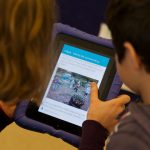‘The word ‘love’ is a tricky one when applied to the early childhood education and care space.’ Karen Hope shares part two to her 2018 blog, ‘What’s love got to do with it?‘, keep reading to hear her perspective. The Spoke has published other blogs on this topic and are linked at the end of this blog.

In March 2018 I wrote an article for The Spoke titled ‘What’s love got to do with it?’. The word ‘love’ is a tricky one when applied to the early childhood education and care (ECEC) space and the large amount of feedback I received suggested that people felt very strongly about it, with most communication suggesting, to put it nicely, that I was wrong. My view was and still is, that when we use the word love within the ECEC to explain our motivation for why we work with children, this becomes largely unhelpful in the gains we, as a profession, are trying to make.
For me, I really do have a hard time when the word love is applied to the work that we do with children and our reasons for doing it. I just do not like it, but I think that there is a place for expressing an enthusiasm or commitment for the work you might love to do. The difference is subtle, but it is important. Nurses do not love their patients but they most likely love nursing. This analogy is useful when you apply it to children and teaching.
One of the issues with this word love, is its single use application to describe everything from our feelings about people to food or television programs. It is an overused word. In comparison I have read that the Inuit people of Canada have 50 words for snow, perhaps as some have suggested, this is because living in such an icy and snow-covered landscape for most of the year there is a lot of really important information that might need to be conveyed about snow and one word for everything doesn’t quite cover it.
Recently I shared, with a group of pre-service teachers a video of Tim Minchin’s 9 lessons, that he delivered to the University of Western Australia when he was awarded his honorary doctorate. I shared this video, because after many years, I am about to leave teaching and there were things I wanted to say, to my last group of students and he says them so well. One of the things that he says in this address is:
‘I see it all the time online, people whose idea of being part of a subculture is to hate Coldplay or football or feminists or the Liberal Party. Try to also express your passion for things you love.’
So, with this in mind, I think there is a place for love in our profession when we talk about the work that we do every day.
These are 5 things that I do love about teaching and that I will miss.
I love that:
- I am a specialist. I specialise in neural change. I have the capacity to influence learning and development in our future teachers.
- I get to see the world at a different angle and height than most people. I see the world from a child’s perspective. Most people see the world straight ahead, but I get to look down and look up.
- I get to work with daily attributes of surprise and wonder
- I am a researcher. Every day I am involved in action research.
- I get to practice theory. A daily dose. A touch of Piaget, a dose of Bronfenbrenner and a massive helping of the Reggio Emilia Approach. These theories and many more give me the capacity to understand children and their families using multiple lenses.
Lastly, back to Tim. I particularly love it when he says ‘Be a teacher. Please, please, please be a teacher. Teachers are the most admirable and important people in the world.’
Yes, they are.
Professional love is a controversial topic within the early education sector, you can find other blogs on this topic on The Spoke, with different perspectives: ‘Is love the same as care‘, ‘Love and care—where has it gone in early years practice?‘
ECA Recommends
Mindset Matters
By Fiona Boylan
Research in Practice Series title
The beliefs children hold about their own intelligence, talents and abilities are formed during the earliest stages of life. These beliefs—known as a mindset—influence learning, motivation, self-regulation and achievement. Applying mindset theory in early learning settings can assist educators in developing children’s social–emotional skills and increase their agency in learning.
You can purchase a copy on the ECA Shop.











Dear Karen
I ‘love’ your reflection on what you love about teaching and being an early childhood professional. Thanks for your honesty, thoughtfulness and capacity to make me think in every blog you have written. I’m sure that you will be ‘teaching’ wherever you are working. Best wishes! Anne